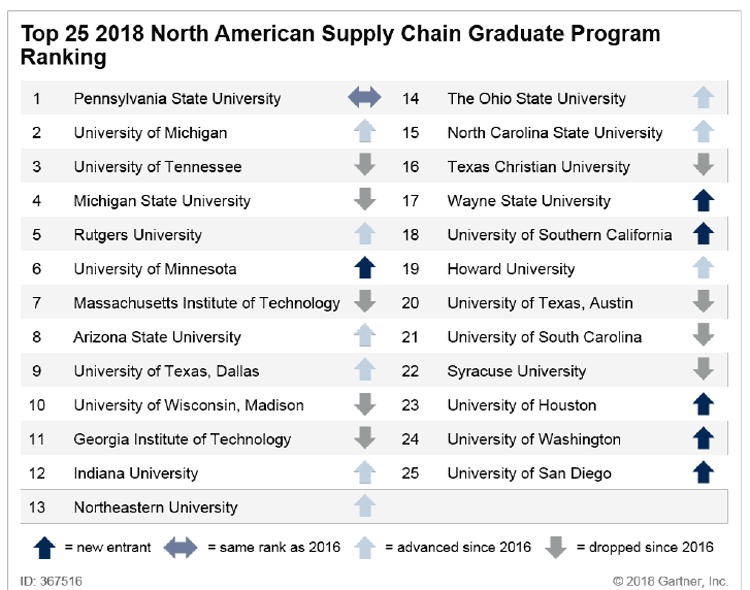Since 2008, the analysts at Gartner have annually ranked the top undergraduate and graduate programs at North American universities.
This week, we'll summarize the graduate list, and then look at the undergraduate ranking next week.
Supply Chain Digest Says... |
|
|
The rankings are largely based on a web survey document, sent to 88 supply chain program contacts at universities in the US and Canada. In total, 67 universities responded, 53 of which had graduate supply chain programs and provided complete survey responses.
Forty six of those universities offered eligible programs: delivered on-campus or in a hybrid on-campus/online format. Gartner then followed up with respondents where survey responses were incomplete or unclear, and reviewed university websites and course catalogs for additional information on program and course content.
Responses and clarifications were collected throughout the spring of 2018.
The final placement of university programs in Gartner's relative comparison is based on a composite score of three categories:
Program scope (40%): Number of "attributes" taught, attributes referring to Gartner's supply chain talent attribute model, so really it's about the breadth of course offerings.
Industry value (40%): Includes such factors as citations from a parallel survey of supply chain practitioners, average starting salary for graduates, and average years of work experience of graduate students.
Program size (20%): The number of full- and part-time supply chain students as well as full-time faculty in the program
Where programs tied, Gartner looked at program scope and advanced the program with the higher score. Where programs were still tied on program scope, the program with the higher score for internships, project work and average years of experience was advanced.
The data in this survey is based on the 2016-2017 academic year. The universities include some with an MBA program with a supply chain concentration, those with distinct supply chain, logistics or operations management degrees, and those offering a master's of science degree in supply chain.
(See More Below)
|
CATEGORY SPONSOR: SOFTEON |
|
|
| |
|
|
So with that introduction, the list of the top 25 programs for 2018 is listed below:

As we believe has always been the case, Penn State sits atop the list, followed by University of Michigan, University of Tennessee, Michigan State University and Rutgers to round out the top 5.
If you received such a degree from Penn State, you are doing pretty well, Garter reports, with average starting salaries of $120,000. Across all programs, average starting salaries were about $88,000.
There were some surprises. What is the University of Minnesota doing there in the number 6 spot, for example? This was Minnesota's first year of eligibility for the list, but it distinguished itself by the “strength of its curricula, applied experience, high average salaries and industry practitioner votes from its network,” Gartner said.
MIT used to be in the top 5 but has fallen to number 7.
As we say each year for the Gartner top 25 supply chains, the process is far from perfect here as well, but it's the best we have, and certainly stirs the pot.
What do you think of these Gartner rankings of the top supply chain programs? What would you add the criteria?Let us know your thoughts at the Feedback section (email) or button
below.
Your Comments/Feedback
|